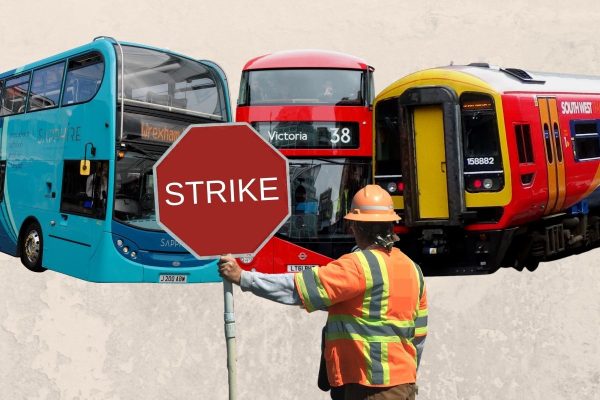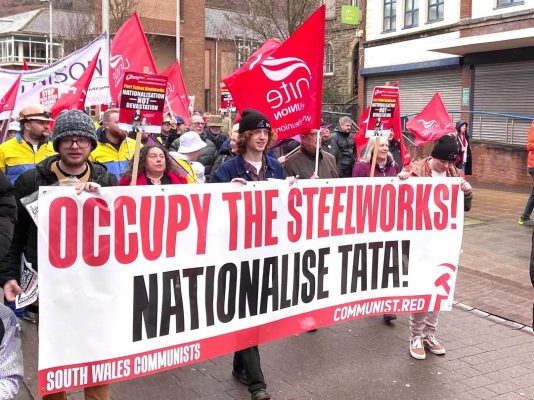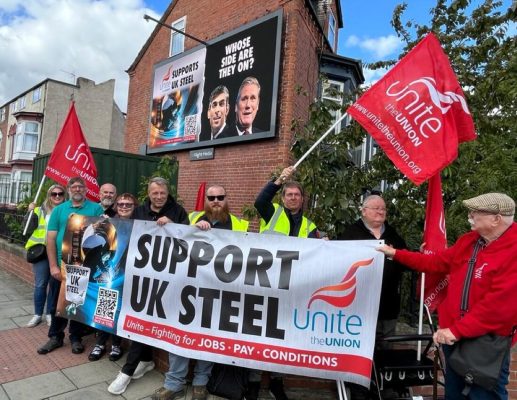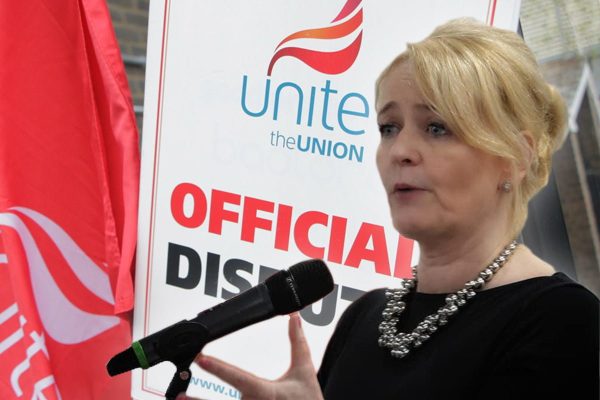Over the past year, the trade union movement’s attention has focussed away from the industrial front and towards the political plane, with union leaders choosing to ‘wait for Labour’ – hoping that a future Starmer government will solve workers’ burning problems.
Now the wait is almost over. A Starmer supermajority is imminent.
At the same time, the crisis in British industry is gathering pace. Hundreds of thousands of workers wake up each morning uncertain about their futures. From Port Talbot to Grangemouth: jobs massacres are on the way, if they are not already occurring.
The question on workers’ minds is: What are we going to do about it? What can we expect from a Labour government?
What’s needed is a real battle plan for the labour movement. Our class can’t trust any promises that Starmer’s Labour makes; nor can we rely on moralistic appeals to those in Number 10. Yet the union tops have no strategy beyond this. Their only request is for a seat at the table, in order to gain the ear of the next prime minister and beg for a few extra crumbs.
Dithering
Unfortunately, in the main, the trade union leaders are fiddling while British industry burns. Instead of organising bold action to save factories and jobs, they are dithering and dragging their feet.
At Alstom, for example, a leading train manufacturer employing 1,300 workers in Derby, only a sudden order for London’s Elizabeth Line saved the factory. Unite the Union, for the most part, restricted itself to angry press releases and calls for the government to intervene.

In Wales, meanwhile, the crisis at Port Talbot drags on. The three steel unions have agreed to an overtime ban. But this falls far short of what is needed to save the steelworks.
In both cases, the excuse offered is that Labour will fix things when it takes power. But now Starmer is virtually in office. And yet there is still no hope on the horizon.
Confusion
This should not be a surprise to anyone. Starmer and his cronies have made it crystal clear whose side they stand on. They intend to govern for big business, not workers – hence their constant hokey-cokey around their so-called ‘new deal for working people’, alongside their endless overtures to the City of London.
Unsurprisingly, the more conservative, right-wing union leaders, such as those of Unison and GMB, are happy to cover for Labour in these circumstances.
But even Unite, a seemingly more ‘militant’, ‘left’-led union, has not been much better.
In the past, general secretary Sharon Graham distanced herself from politics altogether, saying that she was only interested in economic, workplace struggles.
In recent weeks, meanwhile, she has flipped between making statements about “meaningful” policy talks with the Labour leaders, to offering furious condemnations when these talks break down in betrayal.
The overall result is to sow confusion amongst rank-and-file members, precisely at a moment when a clear perspective and fighting strategy is needed.
Action
In this age of crisis and uncertainty, it is vital that the unions properly prepare their memberships for battle, rather than hinging everything on talks with the employers.
For starters, whenever such closures are threatened, the demand must go up for the bosses to open up the books to the unions, so that workers can see for themselves where the money is really going, and what the real state of play is.
If negotiations are to take place, organised workers should be placed in the driving seat. Rank-and-file workers should be involved in decision-making through regular mass shopfloor meetings. And most importantly, any talks should be backed up by militant action.

This means organising strike ballots, and mobilising members to win these. Instead of isolated, piecemeal action, meanwhile, efforts should be made to broaden the struggle out, and to unite workers together across related workplaces and industries.
To this end, rank-and-file strike committees should be elected to coordinate action; to organise a mass campaign, with appeals to the local area and the rest of the labour movement for solidarity and support; and to make preparations for escalation if the bosses don’t budge, including a workers’ occupation.
Importantly, the trade union movement must demand nationalisation – without compensation – of industries threatened with closure.
The Labour leaders will only take notice and act on such demands, however, if they are forced to: not by hand-wringing and hot air, but by the organised working class flexing its muscles.
Powerful mass mobilisation and militant action is the only way to make any future Labour government listen.
Leadership
British capitalism is in a dire state, and is only getting worse. Starmer’s Labour, meanwhile, has effectively signed itself up to further austerity, despite any hollow pledges to the contrary.

The conditions for a new strike wave are therefore being prepared. We can expect a sharpening and intensification of the class war in the period ahead. There will be no honeymoon period for Starmer.
Fighting leadership is required – a leadership prepared to stand up to a right-wing Labour government, and utilise the unstoppable strength of the working class to make real gains for workers.
Crucially, the movement needs leaders who take aim at the real cause for society’s ills: capitalism itself.
The RCP is striving to forge such a force. Get organised today, and help us build a communist voice in every workplace and union.
Port Talbot: Steel rally shows fighting spirit
Ashton Munro, Port Talbot welder
On 18 June, Unite held a rally to kick off their long-awaited overtime ban against the closure of the Port Talbot blast furnaces.
The rally was held just outside the steelworks, with attendees holding banners and waving a sea of red flags. Swansea RCP comrades attended the rally, speaking to the workers and offering solidarity.
This event follows various scandalous attempts from Tata Steel to undermine industrial action. They’ve questioned the legality of strike ballots and threatened to revoke redundancy payments. But this has only angered workers, as the ballot results themselves showed.

This anger also explains why this gathering was larger than most of those held by the unions previously. A wide layer of the community – from trade unionists to climate activists – joined the demo, in support of the steelworkers’ fightback.
The general mood at the rally was lively. But many of the steelworkers we spoke to were still frustrated at how long it has taken for the unions to get to this point.
Many told us that they want a real fight against Tata, before it’s too late. They understand that there is no hope for the steelworks if opposition is left purely to behind-the-scenes negotiations.
Workers need to take the struggle into their own hands. All three of the steel unions in Port Talbot have strike mandates. So why not use these as a springboard for a campaign of militant action, including an occupation of the steelworkers?
Some officials at the rally – echoing the statements made by Unite general secretary Sharon Graham – stuck to the line that the coming labour government will step in to save the steelworks.
But Starmer’s Labour has flip-flopped on every promise. And closure of the blast furnaces looms imminently. ‘Waiting for Labour’ is therefore a dangerous game to be playing.
With a mass campaign of action, however, drawing in the surrounding towns and the rest of the trade union movement, Starmer’s hands can be forced.
Immediate, militant action is the only way to bring about the nationalisation of the steel industry in Britain, to ensure the survival of towns like Port Talbot. There’s no time to waste!
Unite’s flip-flops over Labour: Disorienting workers, disarming our movement
Arsalan Ghani, Cambridge Unite (in a personal capacity)
As a member of Unite, I read with dismay in The Communist how our union leadership has flip-flopped between endorsing and attacking the Labour Party in recent weeks.
First, the leadership threatened to withdraw funding for Labour, after the party watered-down its pledges on workers’ rights.
Then union officials dropped their opposition, following “a really good meeting” with Keir Starmer, where he merely agreed to further talks, while in fact backtracking on his promises.
With Labour’s manifesto now published, Unite’s general secretary Sharon Graham has decried the party’s proposals, saying that they have “more holes than Swiss cheese”, and refusing to back them.

But there is not a word from our union’s leader on how to actually fight the austerity and attacks that a Labour government will implement!
This dizzying merry-go-round exposes the union leadership’s confused approach to the Labour Party.
They swing from rejecting politics altogether, saying that “nobody is coming to save us”, to cosying-up to the Labour leaders and calling for members to vote for them, depending on which faction of the union leadership is more vocal at any given time.
The reality is clear. Starmer represents the bosses, not workers. No amount of clever negotiations can change this.
Instead of relying on backroom deals, toothless threats, or denunciatory statements, our union’s leadership should be mobilising rank-and-file members for militant and coordinated action.
Above all, we should be preparing to fight Labour’s impending attacks – not fostering false hopes in Starmer, who is hell-bent on serving his capitalist masters.
It’s high time that the unions, including Unite, championed and fought for a bold socialist programme – instead of abandoning politics or sowing illusions in establishment politicians.
No trust in Starmer’s Labour! The working class can only rely on its own strength!






